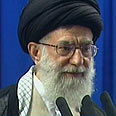
Iranian student stuns country by criticizing supreme leader
College math student Mahmoud Vahidnia slams Khamenei, says 'I don't know why in this country it's not allowed to make any kind of criticism of you'
An unassuming college math student has become an unlikely hero to many in Iran for daring to criticize the country's most powerful man to his face.
Mahmoud Vahidnia has received an outpouring of support from government opponents for the challenge, unprecedented in a country where insulting supreme leader Ayatollah Ali Khamenei is a crime punishable by prison.
Perhaps most surprising, the young math whiz has so far suffered no repercussions from the confrontation at a question-and-answer session between Khamenei and students at Tehran's Sharif Technical University.
In fact, Iran's clerical leadership appears to be touting the incident as a sign of its tolerance – so much so that some Iranians at first believed the 20-minute exchange was staged by the government, though opposition commentators are now convinced Vahidnia was the real thing.
Details of the encounter were reported on the state news agency IRNA and in a pro-government newspaper, Keyhan, which gave its account with a headline reading, "The revolutionary leader's fatherly response to critical youth." Even Khamenei's official Web site mentioned the incident. .
The session began with a speech in which Khamenei told the students the "biggest crime" was to question the results of the June 12 presidential election that returned hard-liner Mahmoud Ahmadinejad to power. Khamenei himself declared Ahmadinejad the victor despite opposition claims of widespread fraud.
After the speech, Vahidnia raised his hand, then for 20 minutes he criticized the Iranian leader over the fierce crackdown on post-election protests, in which the opposition says 69 people were killed and thousands were arrested.
'We welcome criticism'
In brief excerpts broadcast on state TV, the thin, bespectacled Vahidnia was shown standing behind a podium, gesturing at times for emphasis.
"I don't know why in this country it's not allowed to make any kind of criticism of you," said the student, wearing a long-sleeved blue polo shirt and appearing calm.
"In the past three to five years that I have been reading newspapers, I have seen no criticism of you, not even by the Assembly of Experts, whose duty is to criticize and supervise the performance of the leader," he said, referring to the clerical body that chooses the country's supreme leader.
Khamenei countered, "We welcome criticism. We never said not to criticize us. ... There's plenty of criticism that I receive," according to accounts in state media and on opposition Web sites.
The boldness of Vahidnia's comments underlines how Iran's post-election turmoil has undermined the once rock-solid taboo against challenging the supreme leader. During demonstrations, young protesters have frequently chanted "Death to the dictator" – referring to Khamenei – and even "Khamenei is a murderer." Several high-ranking pro-opposition clerics have also been openly critical.
But so far Vahidnia has been spared. The president of Sharif University even defended the student, saying he spoke within the law.
The incident has propelled the soft-spoken man in his early 20s to national prominence and inspired widespread support on the Web.
The night of the encounter, fellow students gathered, shouting, "God is great" and "death to the dictator" in support of their colleague, according to video footage posted on pro-reform Web sites.
"Vahidnia showed a new atmosphere which is the true characteristic of the Iranian people," Ataollah Mohajerani, a former pro-reform Cabinet minister, wrote on his Web site. "If from now on in gatherings in the presence of the supreme leader one finds the courage to get up and speak in defense of justice and right, the climate of tyranny will suffocate."
Speaking to The Associated Press, Mohajerani dismissed the idea that Vahidnia could have been planted by authorities, but said the state was using the incident to try to paint itself in a better light.
"Khamenei wants to show that the leader is totally prepared to face criticism," Mohajerani said in a telephone interview from London.
'Role of a father'
During the face-to-face exchange, Vahidnia also raised allegations of abuse of imprisoned opposition protesters.
"You, who have the role of a father, when you deal with your opponents in such a manner, your subordinates will likely behave similarly, as we have seen in the prisons," he told Khamenei, referring to the reports of torture and rape.
He also criticized state-run Iranian television and radio for their depiction of the protests as the work of troublemakers and pawns of Iran's foreign enemies. "Do you think radio and television have portrayed the recent events accurately or broadcast a caricature-type image of them?" he asked.
The supreme leader countered that he had his own criticisms of state media, including their failure to give enough coverage to the government's "positive achievements."
"Don't assume that because I appoint the head of state television, they bring all their programs to me for approval," the Iranian leader said, adding that state broadcasts of the situation in the country were "incomplete."










